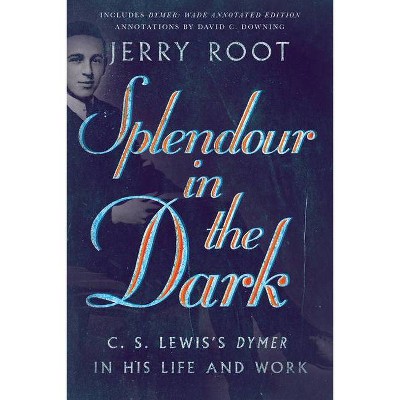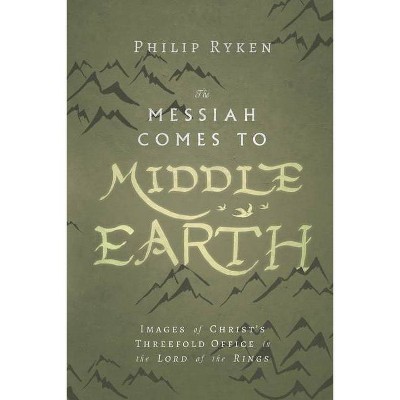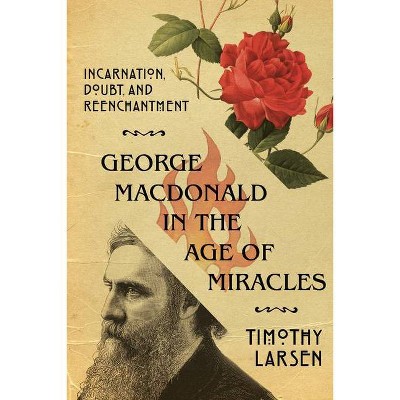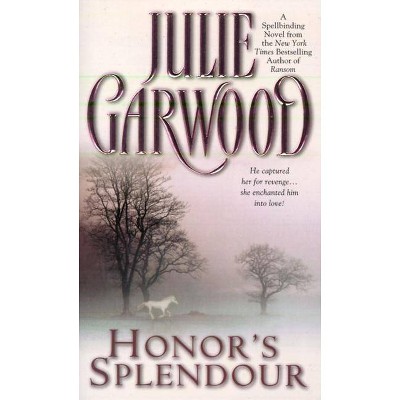Splendour in the Dark - (Hansen Lectureship) Annotated by Jerry Root (Paperback)

Similar Products
Products of same category from the store
AllProduct info
<p/><br></br><p><b> About the Book </b></p></br></br><p>Several years before he converted to Christianity, C. S. Lewis published a narrative poem, <em>Dymer</em>, which not only sheds light on the development of his literary skills but also offers a glimpse of his intellectual and spiritual growth. Including the complete annotated text of Lewis's poem, this volume helps us understand both Lewis's change of mind and our own journeys of faith.</p><p/><br></br><p><b> Book Synopsis </b></p></br></br><p> <strong>Several years before he converted to Christianity, C. S. Lewis published a narrative poem, <em>Dymer</em>, under the pseudonym Clive Hamilton.</strong> Later, of course, Lewis became well known for his beloved imaginative stories, such as <em>The Chronicles of Narnia</em> and <em>Till We Have Faces</em>, as well as his ability to defend and articulate the faith in works such as <em>Mere Christianity</em>. But what about his literary work before his conversion? In this fourth volume in the Hansen Lectureship Series, Jerry Root contends that Lewis's early poem <em>Dymer</em> can not only shed light on the development of Lewis's literary skills but also offer a glimpse of what was to come in his intellectual and spiritual growth--a splendour in the dark, to borrow one of Lewis's own lines from the poem. Under Root's careful analysis, <em>Dymer</em> becomes a way to understand both Lewis's change of mind as well as the way in which each of us is led on a journey of faith. This volume also includes the complete text of <em>Dymer</em> with annotations from David C. Downing, co-director of the Marion E. Wade Center. The Hansen Lectureship series offers accessible and insightful reflections by Wheaton College faculty members upon the transformative work of the Wade Center authors.</p><p/><br></br><p><b> Review Quotes </b></p></br></br><br><p><em>Splendour in the Dark</em> is an important new work on the narrative poem Lewis wrote before his conversion to Christianity. In addition to printing the complete text of the poem, the highlight of the volume is three commentary chapters by Lewis scholar Jerry Root and the response to each chapter by a different reader of <em>Dymer</em>. Root's intimate knowledge of the Lewis corpus is everywhere present, and his essential argument that by knowing <em>Dymer</em> readers will recognize many important themes of Lewis's postconversion writings is compelling.</p>--Don W. King, author of C. S. Lewis, Poet: The Legacy of His Poetic Impulse<br><br><p>A delightful book that brings new life to a coming-of-age story many years in the writing, published in the 1920s by then-unbeliever C. S. Lewis, who aspired at that time to be a great poet. As a book-length poem, <em>Dymer</em> turned out to be 'a fascinating failure, ' as David C. Downing deftly points out in his foreword. For Jerry Root, the main commentator on the poem, its story yields many treasures--'splendour in the dark'--that would reappear in various genres in the future Lewis's prose, as he became an engaging writer for scholars and also wider readerships. This brilliantly informative book also includes David Downing's enlightening annotations of the complete poem, and other scholars in wide-ranging dialogue with Root that adds a rich dimension to this exposition of <em>Dymer</em>. The coming-of-age story is discovered to reveal much about the development of C. S. Lewis's own life and thought, away from destructive subjectivism to acceptance of iconoclastic shaping by the real: how the central quest of Lewis's writing becomes the capture of the real, as with the elusive experience of Joy, or <em>Sehnsucht</em>. <em>Dymer</em>'s story engages in the life-and-death theme that reality is iconoclastic: to be tasted, even if bitter.</p>--Colin Duriez, author of, C. S. Lewis: A Biography of Friendship and Dorothy L. Sayers: A Biography<br><br><p>A few years before the publication of <em>Dymer</em>, the then-atheist Lewis wryly reported how a friend of his was predicting that one day 'my chimney stack would turn into a spire.' The prophecy was spot-on and <em>Dymer</em> provides insights into some aspects of that gradual process of spiritual reconstruction. This volume helpfully illuminates the poem, debates its value, and points out ways it foreshadows Lewis's mature work. A welcome addition to the scholarship on his early life and poetry, which I warmly recommend.</p>--Michael Ward, fellow of Blackfriars Hall, University of Oxford, and coeditor of C. S. Lewis at Poets' Corner<br><br><p>C. S. Lewis's narrative poem <em>Dymer</em> is indeed a 'splendour in the dark, ' not only because it has been hidden in the darkness of neglect but also because, for those who read and enjoy it, there is still much that remains dark and difficult in the poetry, for all its many splendors. And here Jerry Root has done us all an immense service, by rescuing this neglected poem from obscurity and presenting us with an excellent, scholarly edition. But more than that, in the essays that follow the text, Root has shone considerable light on the poem and, through the poem, on Lewis himself. He shows how much the poem is 'the acorn that contains the oak, ' how much of what we love in the later and better-known writings of Lewis has its seed and beginning here. Everyone who loves Lewis will not only enjoy this book but also find that Root's commentary on <em>Dymer</em> enhances their reading of Lewis's other works as well.</p>--Malcolm Guite, Girton College, Cambridge, author of Mariner: A Theological Voyage with Samuel Taylor Coleridge<br><br><p>Dr. Root masterfully brings an overlooked, preconversion piece by C. S. Lewis into the light. <em>Dymer</em> represents the journey we must all take through Ecclesiastes in our pilgrimage to Revelation, from the emptiness of vanities toward the 'good dreams' of a redeemed creation and the grace of God's relentless pursuit for the soul's salvation. This poem deserves serious consideration in the Lewis canon for its unique contribution in evaluating the life and work of a complex yet humane and always highly relevant spiritual thinker.</p>--Carolyn Weber, professor and author of Surprised by Oxford and Sex and the City of God<br><br><p>Finally, a book that gives <em>Dymer</em> the attention it merits. Just so does Jerry Root--with a mind plentifully furnished in the life and work of the master--convincingly examine story and verse as a touchstone of Lewis's developing genius. Of course, getting the whole poem with David Downing's superb annotations (along with extended commentary by others, as though in conversation) represents enormous value added. Highly recommended.</p>--James Como, author of C. S. Lewis: A Very Short Introduction<br><br><p>Isn't it remarkable that this poem, written almost a century ago, has now been brought to life? Of course, because the poem's author was C. S. Lewis, it will be of interest to a whole slew of Lewis lovers, eager for fresh material to ingest in the name of literary scholarship. Dr. Jerry Root, a longtime advocate and commentator of the Lewis oeuvre has given us a new reading to ponder, and in this annotated version of <em>Dymer</em> he offers an appreciation of Lewis's power of versification and command of language. As you read, you are made aware of a practicing wordsmith doing his exercises and enjoying himself immensely. His early studies with W. T. Kirkpatrick, which involved Greek and Latin, gave the young Lewis an understanding of how much of the English language evolved, and thus supplies even this early writing with a richness and depth.</p>--Luci N. Shaw, author of Thumbprint in the Clay<br><br><p>Jerry Root has succeeded in making <em>Dymer</em> interesting and showing that the poem is worthy of academic study. He has also been brave enough to invite people who disagree with him to contribute to the volume. This is a fascinating read on a difficult subject.</p>--Suzanne Bray, Lille Catholic University<br><br><p>Jerry Root's <em>Splendour in the Dark</em> richly illuminates C. S. Lewis's early halting--and at times haunting--expression of themes that would occupy his writing for the rest of his life: the confusion of freedom with radical autonomy, the painful truth that spiritual growth demands ruthless self-honesty, and the conviction that our deepest longings only find fulfillment in God. This book is essential reading for anyone seeking a deeper understanding of the life and thought of the twentieth century's most influential Christian writer.</p>--Gary S. Selby, author of Pursuing an Earthy Spirituality: C. S. Lewis and Incarnational Faith<br><br><p>Lewis is one of those authors whose breadth can obscure his depth. The mountainous influence of <em>Mere Christianity</em> or <em>The Lion, the Witch and the Wardrobe</em> can overshadow those subterranean works on which his popular writing stands. No early work by Lewis is so foundational as his preconversion poem, <em>Dymer</em>. In excavating the ways in which Lewis's more monumental works rise from and build upon <em>Dymer</em>, Root has taken readers further down and further into that depth.</p>--Corey Latta, author of C. S. Lewis and the Art of Writing<br><br><p>When C. S. Lewis went to study with his tutor William T. Kirkpatrick, he delighted in the robust intellectual curriculum placed before him. It was challenging and Lewis loved it. Hard stuff. Good stuff. Nourishing for mind and soul. That is exactly the sense one gets while reading the marvelous lectures collected in this book: we are invited to study ideas of substance under the direction of a great teacher. Thank you, Jerry Root, for revealing the themes, ideas, and structures that make <em>Dymer</em> worth knowing. Hard stuff. Good stuff. Nourishing for mind and soul.</p>--Diana Pavlac Glyer, professor in the Honors College at Azusa Pacific University and author of Bandersnatch: C. S. Lewis, J. R. R. Tolkien, and the Creative Collaboration of the Inklings<br>
Price History
Price Archive shows prices from various stores, lets you see history and find the cheapest. There is no actual sale on the website. For all support, inquiry and suggestion messagescommunication@pricearchive.us




















